NEWSLETTER QUICK ACCESS TO CONTENT
 The International Health Bulletin is a publication developed by the Edmundo Granda Ugalde Leaders in International Health Program (LIHP) of the Pan American Health Organization/World Health Organization (PAHO/WHO). The purpose of the Bulletin is to contribute to the dissemination of information on international health issues among Program participants and other relevant actors who work in the areas of public health and international relations, enabling them to learn more about the LIHP, as well as relevant issues and opportunities related to international health. The International Health Bulletin is a publication developed by the Edmundo Granda Ugalde Leaders in International Health Program (LIHP) of the Pan American Health Organization/World Health Organization (PAHO/WHO). The purpose of the Bulletin is to contribute to the dissemination of information on international health issues among Program participants and other relevant actors who work in the areas of public health and international relations, enabling them to learn more about the LIHP, as well as relevant issues and opportunities related to international health.
This issue of the Bulletin includes information about the LIHP 2013 cohort, with emphasis on the face-to-face module in Guatemala and the technical meetings held at the country level with PAHO/WHO Country Offices and other national and international actors. There is also a report on the country projects developed by the LIHP 2012 cohort in cooperation with national authorities and PAHO/WHO Country Offices, as well as information regarding events in the field of international health.
The Edmundo Granda Ugalde Leaders in International Health Program is pleased to present the 2013 cohort. This year’s group includes 47 participants from 22 PAHO Member Countries and represents the sixth year of the LIHP. The participants come from diverse institutional and academic backgrounds, including health, international relations, social sciences, environmental sciences, economics, veterinary medicine, engineering, and others.
The 2013 Opening Ceremony took place virtually on 3 June 2013, with approximately 100 people participating from over 20 different countries. The bilingual event included a keynote presentation by Dr. José Romero Teruel in his role as Assistant Director a.i. of the Pan American Sanitary Bureau. Dr. Teruel highlighted the contributions of the Program in the development of professionals who are able to address health and development challenges in an increasingly globalized world.
 Throughout the course of the nine-month Program, participants interact with each other, tutors, mentors, and other experts to debate relevant issues and complete the learning activities in each of the Program’s modules. To date, the participants have completed the first six learning modules: The National Context in a Globalized Environment; The Historical and Conceptual Bases of International Health; Conflicts, Tensions and Human Rights; International Cooperation and Health Diplomacy; Nutrition, Human Capital and Development; and Climate Change, Development and Health. They are currently developing activities related to the final two modules, Chronic Diseases and Trade, and Access to Medicines, Trade and International Agreements. Throughout the course of the nine-month Program, participants interact with each other, tutors, mentors, and other experts to debate relevant issues and complete the learning activities in each of the Program’s modules. To date, the participants have completed the first six learning modules: The National Context in a Globalized Environment; The Historical and Conceptual Bases of International Health; Conflicts, Tensions and Human Rights; International Cooperation and Health Diplomacy; Nutrition, Human Capital and Development; and Climate Change, Development and Health. They are currently developing activities related to the final two modules, Chronic Diseases and Trade, and Access to Medicines, Trade and International Agreements.
Participants are also required to develop a country project relating to a real-life priority public health issue in their country or region, which they present upon culmination of the Program. Through this project, the Program’s learning activities reinforce one another and help participants form professional networks and develop competencies that will better enable them to address the evolving challenges in international health. Participants will present their final projects in February 2014.
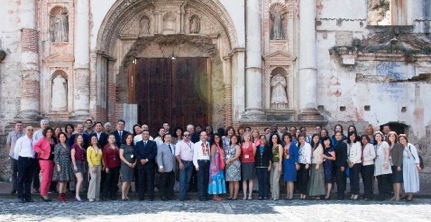
The forty-seven participants of the 2013 LIHP representing 22 Latin American and Caribbean countries met from 8-12 July in Antigua, Guatemala together with LIHP mentors and coordinators and PAHO/WHO Country Office staff in Guatemala. The purpose of the meeting was to allow participants to explore in greater depth issues related to international health, including the main concepts, theories and models of international health, its manifestations in the national and regional context and its implications for the Americas.
The meeting was organized by the Pan American Health Organization/World Health Organization (PAHO/WHO), with support from the Training Center of the Spanish Cooperation Agency (AECID according to its acronym in Spanish) and from the Ministry of Public Health and Social Assistance in Guatemala. This meeting represented the second learning module of the LIHP and allowed participants the opportunity to present their preliminary country project proposal which would be developed throughout the year.
“One of the primary goals of international health professionals is to improve the health situation in developing countries; this is a major challenge that requires them to face important problems” said Dr. Mayarí Centeno, Inter-institutional Coordinator for the Guatemalan Ministry of Public Health and Social Assistance. “The training approach [of the Program], which focuses on international cooperation, human rights, trade, development, science and technology, culture and security, guarantees the development of international health leaders that are highly qualified to act on behalf of their countries”, she added.
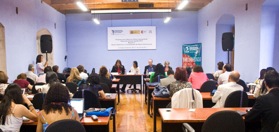 In the face-to-face meeting, the participants discussed the conceptual model of international health used by the LIHP and its relevance for the countries. The participants also strengthened their skills, such as those in negotiation and communication, which will contribute to their role as leaders in the field of international health. In the face-to-face meeting, the participants discussed the conceptual model of international health used by the LIHP and its relevance for the countries. The participants also strengthened their skills, such as those in negotiation and communication, which will contribute to their role as leaders in the field of international health.
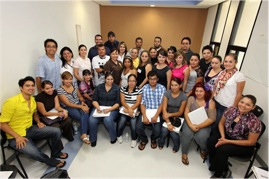 An important part of the LIHP is the development of a country project in collaboration with the PAHO/WHO Country Office and other national, regional and/or international organizations. Before the meeting in Antigua, PAHO/WHO Country Offices organized onsite activities and meetings for the participants from their respective countries with two specific objectives: (1) to help participants identify national health priorities, in accordance with the cooperation strategy of the United Nations and PAHO/WHO in each country (CCA-UNDAF-CCS), the main challenges and the actors involved; and (2) to reflect upon and discuss with national authorities, the PAHO/WHO Country Office and the LIHP Coordination the international health country topic, in accordance with the guidelines established by the Program. An important part of the LIHP is the development of a country project in collaboration with the PAHO/WHO Country Office and other national, regional and/or international organizations. Before the meeting in Antigua, PAHO/WHO Country Offices organized onsite activities and meetings for the participants from their respective countries with two specific objectives: (1) to help participants identify national health priorities, in accordance with the cooperation strategy of the United Nations and PAHO/WHO in each country (CCA-UNDAF-CCS), the main challenges and the actors involved; and (2) to reflect upon and discuss with national authorities, the PAHO/WHO Country Office and the LIHP Coordination the international health country topic, in accordance with the guidelines established by the Program.
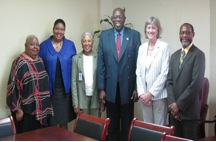 Although the LIHP Coordination provides a general orientation for these encounters, the activities are designed and implemented by each country office to ensure they respond to the needs and interests of the specific country. As such, a variety of activities are developed, including presentations by PAHO/WHO technical areas on their program of work at the country level and how this corresponds to the overall agenda of the United Nations, meetings with national and international authorities with actions in health and development, participation in national consultations, workshops on strategic planning, etc. Participants also have the opportunity to meet with graduates from previous cohorts to exchange information and receive recommendations regarding their projects and experiences in the Program. All of this contributes to a better understanding of the issue which will become the subject of their country project as well as to the establishment of collaborative networks with actors involved in the topic. Although the LIHP Coordination provides a general orientation for these encounters, the activities are designed and implemented by each country office to ensure they respond to the needs and interests of the specific country. As such, a variety of activities are developed, including presentations by PAHO/WHO technical areas on their program of work at the country level and how this corresponds to the overall agenda of the United Nations, meetings with national and international authorities with actions in health and development, participation in national consultations, workshops on strategic planning, etc. Participants also have the opportunity to meet with graduates from previous cohorts to exchange information and receive recommendations regarding their projects and experiences in the Program. All of this contributes to a better understanding of the issue which will become the subject of their country project as well as to the establishment of collaborative networks with actors involved in the topic.
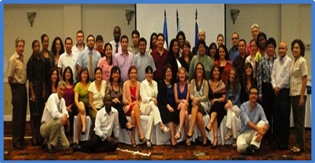 As mentioned in previous bulletins, the country project that LIHP participants develop during the year constitutes the applied part of the Program. This experience allows participants to identify and analyze a particular problem or situation related to public health in their country, sub-region or region from an international health perspective. They are encouraged to delve into the international determinants and commitments surrounding the issue and propose solutions or actions that resolve or improve the same, giving preference to those which require collaboration and intersectoral or supra-national agreements. Participants work individually or in small groups over the course of several months and receive feedback and input on their work from other participants, mentors, PAHO/WHO technical experts and members of their communities of practice. As mentioned in previous bulletins, the country project that LIHP participants develop during the year constitutes the applied part of the Program. This experience allows participants to identify and analyze a particular problem or situation related to public health in their country, sub-region or region from an international health perspective. They are encouraged to delve into the international determinants and commitments surrounding the issue and propose solutions or actions that resolve or improve the same, giving preference to those which require collaboration and intersectoral or supra-national agreements. Participants work individually or in small groups over the course of several months and receive feedback and input on their work from other participants, mentors, PAHO/WHO technical experts and members of their communities of practice.
In the 2012 LIHP cohort, 22 country project were developed Some of the topics included: international cooperation, border health, migration, obesity, family health, mental health, primary health care and public health policy.
The results of the country projects were presented during a series of virtual sessions from 9-19 December, 2012.
 The The Edmundo Granda Ugalde Leaders in International Health Program (LIHP) had an important presence in the activities related to the International Public Health Convention, Cuba Health 2012, which took place in Havana, Cuba from 3-7 December, 2012. The The Edmundo Granda Ugalde Leaders in International Health Program (LIHP) had an important presence in the activities related to the International Public Health Convention, Cuba Health 2012, which took place in Havana, Cuba from 3-7 December, 2012.
Nearly 1,200 people attended the Convention, over half of whom were from different countries around the world. It is worth noting that, among the participants, there were approximately 20 ministers of health from Africa, Asia, Latin America and the Caribbean.
The Convention included plenaries, panels, individual presentations and poster sessions that were organized according to five broad themes: (1) political and social determinants of health; (2) challenges facing health systems; (3) transformations in health systems; (4) research and innovation in health; and (5) training health professionals. Of the former and current LIHP participants whose abstracts were accepted by the scientific committee, 20 professionals representing 12 countries traveled to Cuba and presented their work in the congress.
As a precursor to the Convention, the Second Encounter for International Health and Cooperation was held on 2 and 3 December, 2012, also in Havana. One of eleven side events to the broader Convention, this meeting was organized by the Department of International Relations of the Ministry of Public Health of Cuba, in collaboration with the PAHO/WHO Country Office in Cuba. Its objectives were: to present topics related to international cooperation in health, South-South Cooperation and triangular cooperation; to promote the exchange of experiences and best practices in international cooperation between countries of the region; to discuss conceptual elements related to ‘international public health’ and ‘global health’; and to promote the sharing of experiences regarding training programs in international health, global health and health diplomacy.
Both events were very successful and provided LIHP participants an excellent opportunity to exchange and deepen their understanding of international health together with LIHP alumni and other experts on the topic, learn more about health issues and network with other global professionals, and recommit themselves to their work as leaders in international health.
More information on the Convention and the Encounter are available in the following links:
http://www.convencionsalud2012.sld.cu/index.php/convencionsalud/2012
http://www.convencionsalud2012.sld.cu/index.php/convencionsalud/index/pages/view/simpsalint
 International Congress on Public Health, Antioquia, Colombia International Congress on Public Health, Antioquia, Colombia
The National School of Public Health Héctor Abad Gómez of the University of Antioquia will host the eighth International Congress of Public Health: Social Justice, Human Rights and Health Equity from 27-29 November, 2013 in Medellin, Colombia. The goal of this meeting is to create a space where actors from the public and private sectors, government and non-governmental organizations, as well as academia can gather and discuss the implications of adopting a perspective based on social justice, human rights and health equity on public health, particularly as regards its theoretical development, the training and practice of health professionals, and the health of the populations whom they serve.
Some former and current LIHP participants will be participating in the event and their experiences will be reported in a future edition of this bulletin.
For more information about the Congress, please visit: http://tucanos.udea.edu.co/appsfnsp/congreso/index.php/en/
|

